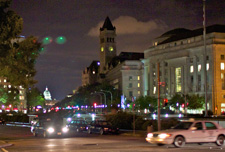I have been known to spend longer writing about a conference than I spent in attending it, but there is little chance of that at the moment when the gaps between conferences are shorter than the events themselves once the travel is factored in. I envy those who can write well whilst on the move, but none of my fundamental requirements for writing are catered for on aeroplanes; no investment in mobile office technology will remedy the vileness of the coffee, the prohibition on smoking and the distressing (I choose the word carefully) number of people who think that the Social Contract entitles them to bring their caterwauling brats into Business Class.
 The Masters Conference for Legal Professionals, held in Washington each October, always provides a high content-to-time ratio. It is double-tracked and, unusually for me, I found something I wanted to attend in every time-slot. Reducing the resulting notes to manageable proportions is something of a challenge.
The Masters Conference for Legal Professionals, held in Washington each October, always provides a high content-to-time ratio. It is double-tracked and, unusually for me, I found something I wanted to attend in every time-slot. Reducing the resulting notes to manageable proportions is something of a challenge.
The sessions which I attended were about the current big themes – possible changes to the rules relating to preservation, whether early case assessment is working (a panel in which I took part), an update from the Bench, technology-assisted review, international privacy and discovery, practical discovery of social media and (always my favourite panel at this conference) the Women Thought Leader panel. The session which aroused most comment was one which I missed, on certification, but fortunately Ron Friedmann made a comprehensive note of it.
These big-theme labels disguise a great quantity of high-value detail. Looking at my notes, at the departure time of my next flight, and at the other stuff which accumulates when one’s back is turned, I am forced to the conclusion that my reports of these sessions will have to wait. The importance of the subject-matter is not going to fade over however long it takes me to get back to this.
 The same applies to the E-Discovery Ireland 2011 conference in Dublin which I moved straight on to after the Masters Conference had ended, as did Browning Marean of DLA Piper US. The contrast could not be greater, but not, perhaps, for the reasons you imagine. The list of topics (as opposed to sessions) on the Masters Conference website includes one which reads “International Judicial Perspectives: is the US leading or following on discovery and disclosure?” which was, I think, put there at my suggestion (I say that because I doubt that anyone else concerned with US eDiscovery would even think to ask the question).
The same applies to the E-Discovery Ireland 2011 conference in Dublin which I moved straight on to after the Masters Conference had ended, as did Browning Marean of DLA Piper US. The contrast could not be greater, but not, perhaps, for the reasons you imagine. The list of topics (as opposed to sessions) on the Masters Conference website includes one which reads “International Judicial Perspectives: is the US leading or following on discovery and disclosure?” which was, I think, put there at my suggestion (I say that because I doubt that anyone else concerned with US eDiscovery would even think to ask the question).
There is nothing marvellous about the eDiscovery regime as practiced in England and Wales which gives us a special vantage point. That comes rather from observation, in most cases at first hand, of developments in a wide range of jurisdictions. The number of one’s air miles is similarly no measure of authority to assert that any one jurisdiction is better than any other. It does, however, allow one to make comparisons between the various rules and practices. Browning Marean, the UK’s Senior Master Whitaker and I had been invited to Dublin for just that purpose; I did a UK and common law session with Master Whitaker and supported Browning in his US panel (“a master-class in how to present” as someone said of Browning’s session).
Ireland has the opportunity of observing developments in other jurisdictions and considering how they map to the foreseeable requirements of its own legal system. The conference provided a roughly equal balance between those who spoke with authority on Irish developments and those who came from outside. As with the Masters Conference, it deserves a fuller report than I can give now.
Next stop is Berlin where I am speaking on Monday with the title Like it or not: Electronic Discovery Cannot be Ignored. Since Nigel Murray of Huron Legal and I are the only ones speaking in English at that conference, I can be reasonably certain that I will not come back with masses of notes for further blog posts. That is just as well, because I am then off almost immediately for the Nuix Exchange in Sydney where, amongst other things, I am facilitating a judicial panel with a US, a UK and an Australian judge.
Then back to Europe via the InnoXcell eDiscovery Exchange in Singapore. I see that Browning Marean and I are reunited yet again there, when I moderate an international legal discovery panel and one on legal hold best practice. As you will conclude from the way I put this, it is not unusual for me to learn what my role is at a conference by looking at its web site. I don’t mind that – it is all interesting, all important and something new emerges from all these different permutations of people in different places.


